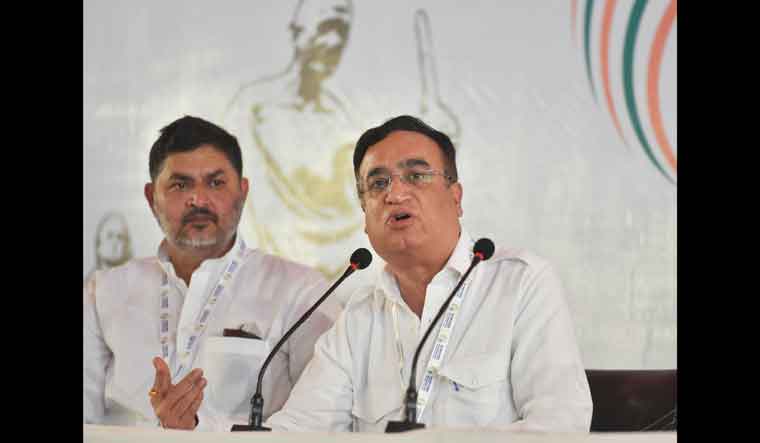The Congress appears set to enforce a ‘one family, one ticket’ norm in the party, with the proposal finding near unanimous acceptance in the discussions held in the run up to the party’s Nav Sankalp Shivir being held in Udaipur.
AICC General Secretary Ajay Maken, who addressed the media ahead of the inaugural of the brainstorming session today, said a consensus seems to have been formed on the ‘one family, one ticket’ norm. He, however, said there would be an exception to the rule, and a second or more persons from a family can contest elections if they have worked for a minimum of five years in the party.
Maken, who is a member of a pre-shivir committee set up by Congress President Sonia Gandhi to recommend organisational changes to be discussed and finalised at the Shivir, said, “The proposal has seen almost complete unanimity in the discussions in the committee.
Another person from the same family can contest provided he or she has worked for the party for five years at least.”
The exception lays to rest speculation on the impact of the rule on the Gandhi family and also whether it would apply to the Gandhis or not.
The committee on organisational forms, one of six set up by the Congress President to suggest the way forward for the party in the backdrop of its rapid decline in recent years, has also suggested a fixed term of five years for the party’s office-bearers that will be followed by a cooling off period of three years. However, the rule will not apply to the post of the Congress President, which will be decided by elections.
Also discussed is the need to bring in more youth into the organisation, and the committee has discussed a proposal that at least 50 per cent of the office-bearers should be less than 50 years of age.
According to Maken, the panel has suggested that a Public Insight Group be formed to carry out surveys amongst the people on a regular basis. “We have had surveys conducted by external agencies only during election time. We have proposed that we have in place an in-house body that can be called the Public Insight Group which will carry out surveys to get feedback from the people and understand their aspirations and issues on a constant basis,” he said.
A group to assess the performance of office-bearers has been discussed and majority of the panelists were in favour of it, Maken said. This assessment wing, he said, will provide for a never-before mechanism to assess the performance of the office-bearers so that those who are performing can be rewarded, and those who do not perform as per expectations can be removed from their posts.
A major reform in the organisational structure suggested by the group is introducing an intermediate unit between the booth and the block. This, Maken said, is provided for in the Constitution of the party. “The smallest unit is the booth. And the next level is the block. We have proposed the setting up of Mandal committees in between these two levels. We have discussed the possibility of having 15-20 booths being part of a Mandal. Three to five Mandals can form one block,” he said.
“The organisation will see some big changes when the suggestions are implemented as part of the Udaipur Declaration. These changes are imperative since the organisation has not changed in tune with the change in times. While new tools of democracy have emerged, the Congress’ organisation has remained unchanged for the last 50-60 years, while our opponents have been faster than us in using these tools,” Maken said.





